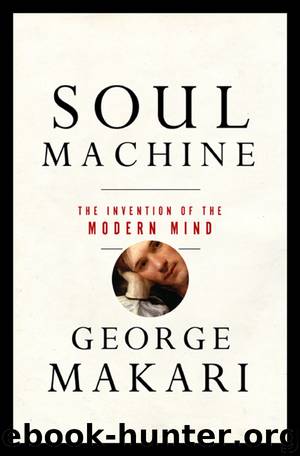Soul Machine: The Invention of the Modern Mind by George Makari

Author:George Makari [Makari, George]
Language: eng
Format: epub, azw3
Publisher: W. W. Norton & Company
Published: 2015-11-01T23:00:00+00:00
Figure 33. The execution of Louis XVI by guillotine, 1793.
THE THERMIDORIAN REACTION ended the Terror and returned to power the stunned, moderate reformers such as those associated with Auteuil. They now stepped forward into a transformed world. Utopians once in search of perfectability, optimistic believers in mankind’s capacity for reason and progress, they had encountered something inside their fellow humans that had roared like a beast. As they sought to remake the ravaged institutions of France, they could not forget the spasms of passion that swept up their countrymen. And, these survivors had to acknowledge that reason alone had not only not prevailed, it had been shouted down and routed. Old Malesherbes told a friend, “In times of violent passions, one must surely keep from speaking reason. (Otherwise) one may even harm reason, for enthusiasts will excite people against the same truths that, in another time, would be received with general approbation.”
What had happened? For many, like Edmund Burke, the answer was simple: sinners and atheists, having already overthrown all vestiges of Christian morality, had run riot. Religion once held back the baser impulses of mankind. If its barriers to disorder were dismissed as superstitions, if heavenly reward and hellish torment for the everlasting soul were all dismissed as delusions, then humans would turn on each other like animals. Royalists and followers of Hobbes might have agreed.
Still, the Thermidorian Reaction in France would not turn back to either kings or priests. Instead, these reformers insisted that the tools of reason could be employed to protect the public from collective violence and madness. In this way, a once hushed-up idea boldly entered the public square. For over a century, a hidden anti-Cartesian, mentalist tradition in France had been constructed, one that rivaled the rational soul or the immaterial Cogito. It included ancient forefathers like Lucretius and Epicurus, as well as Gassendi, Willis, Hobbes, and Locke, the English doctors of the mind, Montesquieu, Helvétius, Condillac, and the Montpellier medical philosophers, Tissot, and even the Marquis de Puységur. There were important differences among these thinkers, but they all contended that at the core of human beings was an embodied, natural mind that was fragile and could easily become influenced, deluded, or ill.
Without fear of the censors, a science and medicine of the esprit could step forward from its hiding places and take up its pressing tasks, one of which was to respond to the chaos of the recent past. Thomas Paine believed that years of chipping away at the old mentalité had changed the French nation and created a revolution from within. When the Bastille was stormed, he had argued, a new order of thought pressed forward its own logic. However, if this new mode of thought embraced individual freedom, autonomous choice, and the search for happiness, did it also countenance summary executions, parading heads on poles, and rampaging fury?
Pierre Bayle scandalized many when he argued that a modern society of atheists could be moral. A century later, the first European experiment with secular ethics looked to many as if it had turned into a catastrophe.
Download
Soul Machine: The Invention of the Modern Mind by George Makari.azw3
This site does not store any files on its server. We only index and link to content provided by other sites. Please contact the content providers to delete copyright contents if any and email us, we'll remove relevant links or contents immediately.
Rewire Your Anxious Brain by Catherine M. Pittman(17620)
Talking to Strangers by Malcolm Gladwell(11956)
The Art of Thinking Clearly by Rolf Dobelli(8901)
Mindhunter: Inside the FBI's Elite Serial Crime Unit by John E. Douglas & Mark Olshaker(7875)
Becoming Supernatural by Dr. Joe Dispenza(7143)
Change Your Questions, Change Your Life by Marilee Adams(6687)
The Road Less Traveled by M. Scott Peck(6672)
Nudge - Improving Decisions about Health, Wealth, and Happiness by Thaler Sunstein(6667)
The Lost Art of Listening by Michael P. Nichols(6514)
Enlightenment Now: The Case for Reason, Science, Humanism, and Progress by Steven Pinker(6435)
Win Bigly by Scott Adams(6342)
Mastermind: How to Think Like Sherlock Holmes by Maria Konnikova(6278)
The Way of Zen by Alan W. Watts(5829)
Daring Greatly by Brene Brown(5679)
Big Magic: Creative Living Beyond Fear by Elizabeth Gilbert(4763)
Grit by Angela Duckworth(4760)
Men In Love by Nancy Friday(4367)
Flow by Mihaly Csikszentmihalyi(4079)
The Four Tendencies by Gretchen Rubin(4044)
